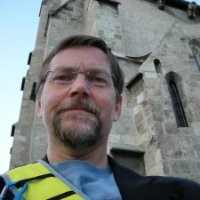
P Bryan Heirdon
- Courses1
- Reviews1
- School: University of Arizona
- Campus:
- Department: Information Science
- Email address: Join to see
- Phone: Join to see
-
Location:
1509 E Helen St
Tucson, AZ - 85719 - Dates at University of Arizona: April 2011 - April 2011
- Office Hours: Join to see
Biography
University of Arizona - Information Science
Resume
2009
Organization for Tropical Studies
COLCIENCIAS
Tucson
Arizona
Support of education
research and service for the collection
dissemination
interpretation
use and preservation of information in society including the public sector
academic sector and the government sector.
Director
School of Information (previously School of Information Resources and Library Science)
The University of Arizona
More time for research now. Working on the Internet of Wild Things and Scientometrics related to scientific data production
dissemination
utilization and preservation.
University of Arizona
School of Information
The Biodiversity Group 501(c)(3)
Tucson
Arizona Area
The Biodiversity Group is an international team of wildlife biologists
educators
and photographers dedicated to preserving the smaller majority of animal life on Earth. Rooted in the science of ecology
we illuminate little known communities of animals in shrinking wild places. Our photography shares beauty
value
and scientific information to a worldwide audience through the camera-eye. And by fostering local citizen-science
we empower people with the experiences
skills
and tools to steward the rich ecosystems that surround and sustain them. Our ultimate goal is to facilitate informed management decisions by people
governments
and land preservation organizations to keep incredible biological landscapes intact for future generations. http://www.biodiversitygroup.org/
Member Board of Directors
Ann Arbor
Michigan
http://sead-data.net/ Sustainability science is a new and growing area of research that focuses on interactions between nature and human activities. These interactions are complex
and knowledge about them is important for guiding how government
industry
and individuals should plan for and respond to environmental and social change.\n\nUnderstanding fundamental principles for sustainable societies requires access to large amounts of data on natural phenomena
human behavior
and economics. Currently
these data are difficult to find
obtain
and use because people from disciplines across the natural and social sciences collect
describe and store their data in many different ways.\n\nThese data could have significant value if it was possible to connect data collectors with potential users of data and if it was easy for individuals to search for
aggregate
and maintain valuable data for the long term.\n\nTo address these problems
the University of Michigan and its partners at Indiana University
Rensselaer Polytechnic Institute
and the University of Illinois will work with sustainability scientists to develop a system for managing and sharing their data.
Member of Advisory Board
SEAD: Sustainable Environment –Actionable Data
Costa Rica
http://www.ots.ac.cr/index.php?option=com_content&task=view&id=860&Itemid=291
Science Committee Member
Organization for Tropical Studies
COLCIENCIAS
2006
JRS Biodiversity Foundation
The National Science Foundation
University of Arizona
University of Arizona
School of Information
The Biodiversity Group 501(c)(3)
SEAD: Sustainable Environment –Actionable Data
DataNet Federation Consortium
The Foundation defined a mission within the field of biodiversity:\nTo enhance knowledge and promote the understanding of biological diversity for the benefit and sustainability of life on earth. (http://www.jrsbdf.org/)
JRS Biodiversity Foundation
1998
University of Illinois at Urbana-Champaign
University of Illinois at Urbana-Champaign
Board of Directors
https://tropicalstudies.org/ The Organization for Tropical Studies (OTS) is a non-profit consortium of nearly sixty universities
colleges
and research institutions worldwide
with operations in three countries and research stations and education programs in Costa Rica and South Africa. For the last half century OTS has been the world’s leading institution in the study of tropical biology
with more than 360 courses in tropical ecology
conservation and global health and over 8000 students trained
including many of the world’s leading tropical ecologists.\n\nOur purpose is to sustain our tropical ecosystems by driving scientific discovery and knowledge
by enriching human perception of nature and by enhancing worldwide policy actions in the tropics.
Organization for Tropical Studies
DataNet Federation Consortium
Chapel Hill
NC
Collaboration Environments for Data Driven Science\n\nMajor science and engineering initiatives are dependent upon massive data collections that comprise observational data
experimental data
simulation data
and engineering data. To support science and engineering collaborations
a policy-driven national data management infrastructure is being implemented. The prototype addresses both the life cycle of science and engineering data and the sustainability of data collections and repositories over time
across changes in technology and usage. http://datafed.org/
Advisory Board Member
The National Science Foundation
University of Arizona
Tucson
Arizona Area
After 9 years stepped down as Director so that I can do more research.
Associate Professor
University of Arizona
1991
Doctor of Philosophy (PhD)
Information Science
University of Pittsburgh
1976
Bachelor of Science (BS)
PsychoBiology
University of Pittsburgh
Bioinformatics
Grant Writing
Biology
Metadata
Biodiversity
Library Science
Machine Learning
Information Retrieval
Digital Libraries
Science
Informatics
Text Mining
Taxonomy
Library
Ecology
Computational Biology
Heidorn
Bryan
